Geotab Ace: One and a Half Years On – The AI Tool Moving from Novelty to Necessity
By Luke Willetts - 16th September 2025

Geotab HQ in Ontario
UK / Canada - The world of commercial vehicle (CV) fleets is changing fast. A perfect storm of evolving regulations, sustainability mandates, and a persistent driver shortage is forcing fleet operators to look for new ways to boost efficiency, retain drivers and ensure safety. At the heart of this transformation is a quiet revolution in how data is collected, analysed, and used to make real-time decisions.
One and a half years ago, Canadian telematics provider Geotab Inc unveiled its AI-powered fleet assistant (Geotab Ace) at its Connect event in Las Vegas. I wrote a piece covering the launch and concluded at the time that this “cutting-edge innovation” was an experiment in natural language AI for fleet management. How would the market react to this experiment? At the time, the market’s response remained uncertain.
Today, Ace has moved firmly from prototype proof of concept to production. We dive deeper into how this tool has become mission-critical for thousands of fleets worldwide, as we document the move from “launch” to a phase of “impact, evolution, and expansion”.
In Europe, this shift is being driven by a new strategic focus. A key figure in this is Aaron Jarvis, Associate Vice President EMEA, who has moved from leading commercial activity in the UK to spearheading a new, segment-focused approach for Enterprise fleets across the EMEA region. He remains based in the UK, highlighting the market's key importance to Geotab's European strategy. With a background in IoT and telecoms, Jarvis is bringing a pragmatic, fleet-first approach to a market that has been historically cautious about adopting new technology. His job is to demonstrate to the UK market how AI can deliver not just insights, but meaningful operational change across commercial vehicle (CV) fleets. T&BB interviewed Jarvis earlier this year to see how this was going.

Aaron Jarvis, Associate Vice President EMEA
What does Geotab offer? Products and Services
To recap, Geotab is a global leader in telematics. Founded in 2000 in Canada by South African-born entrepreneur and current CEO Neil Cawse, the firm remains privately owned. The company offers a comprehensive suite of fleet management solutions. At its core is the GO9 device, which captures vehicle data and feeds it into the MyGeotab platform (described as the company’s "engine room") for analytics and decision-making support. Geotab Drive provides cloud-based storage, while the Geotab Marketplace serves as an integrated ecosystem of third-party solutions, including Lytx cameras and tools for electric vehicle management, safety optimisation, and more. Through its Order Now function and ongoing software innovations, Geotab continues to expand its offerings, helping fleets improve efficiency, sustainability, and safety from a single connected platform.
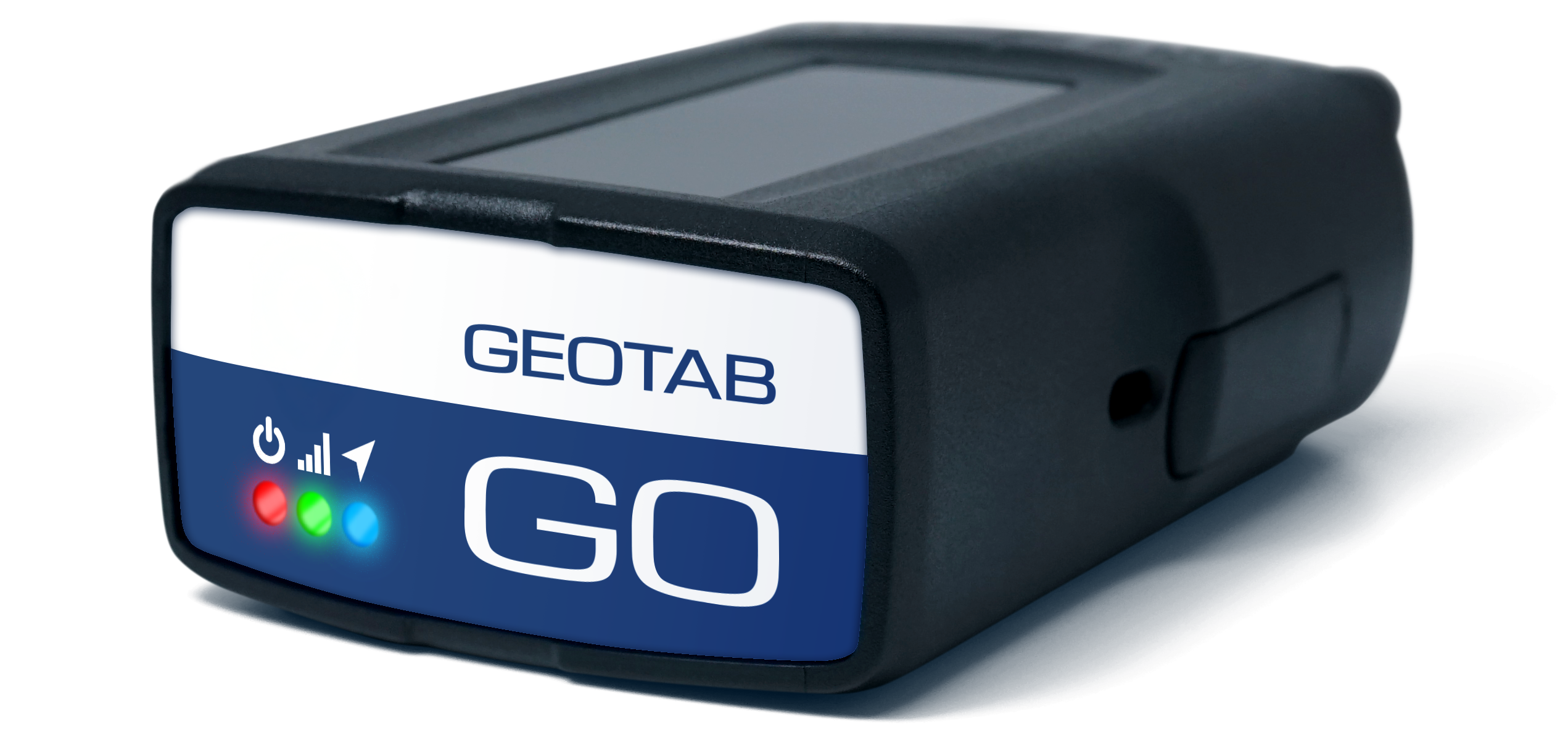
Geotab GO9
The Geotab business model: Globally local and OEM agnostic
Geotab’s business model is described as "globally local," operating in over 160 countries while maintaining a strong regional focus. With approximately five million connected vehicles and over 80 billion data points collected daily, its platform supports logistics giants, public transit agencies, and SME operators worldwide. This regionalised approach has been key to Geotab’s growth. The strategy recognises that each jurisdiction has its legislation, market conditions, and operational requirements, making a one-size-fits-all approach ineffective.
According to Jarvis, a core tenet complementing this approach is being an "OEM agnostic data integrator". This means Geotab can work with data from a variety of sources, including its own GO9 telematics device, which plugs into vehicles, as well as native telematics platforms from OEMs like Stellantis, Ford Pro, BMW, VW, BYD and now, Daimler Truck North America (DTNA). Jarvis explained that these cloud-to-cloud integrations allows Geotab customers to easily access telematics data provided by the OEM through the Geotab platform. Geotab manages the relationship with the OEM, simplifying data access for customers.
This OEM-agnostic approach is a key differentiator. It allows fleets to integrate various data streams, from cameras and tyre pressure monitoring systems (TPMS), which may not be available from a single OEM solution. Jarvis explained that this flexibility is critical for fleets that operate a mix of vehicle brands and models.
The company’s focus on data security and transparency is another one of Geotab’s unique selling points (USP). Ace translates natural language queries into secure SQL code that runs within the customer's own database. This process ensures data sovereignty and allows users to see the underlying code and assumptions, building trust and providing audit trails.
Geotab Ace: From pilot to mainstream
Initially, Geotab Ace was a part of an early adopter program, attracting around 100 companies. Just over a year later, more than 1,500 fleets are actively using the platform regularly. Many of these fleets operate hundreds of vehicles and include logistics firms, healthcare transport providers, utilities, and local authorities. According to Jarvis, this rapid adoption is a testament to its effectiveness in terms of value add. “Fleet managers don’t want to navigate dashboards all day. They want insights in under 10 seconds, in plain English, from a system that understands their business”.
The software updates for Ace are described as "very agile" with daily changes and no fixed release schedule, allowing for rapid iteration and refinement based on real-world customer feedback. The types of questions being asked by fleet managers are also becoming more sophisticated, moving from simple data retrieval to complex analysis.
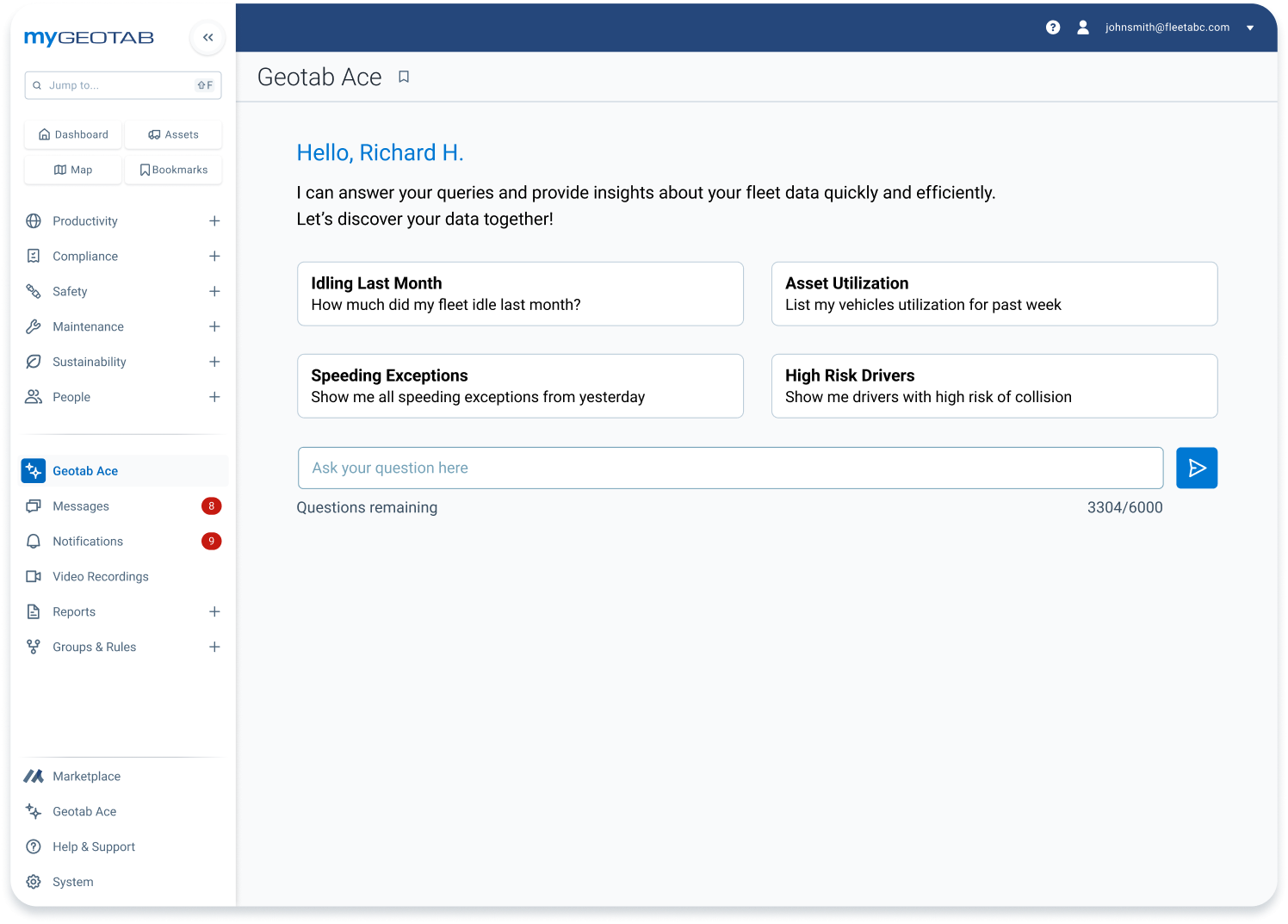
Geotab Ace
How fleets are using Ace today: A shift in priorities
Fleet managers commonly use Ace to monitor performance, detect maintenance issues, and optimise utilisation. According to Jarvis, the tool is designed for real-world usability. Managers no longer need to navigate complex dashboards or export multiple spreadsheets; they can get answers in seconds through natural language queries.
According to Jarvis, the most frequent queries to Ace highlight a fundamental shift in fleet priorities. The questions are moving from simple, reactive reporting to proactive, actionable intelligence.
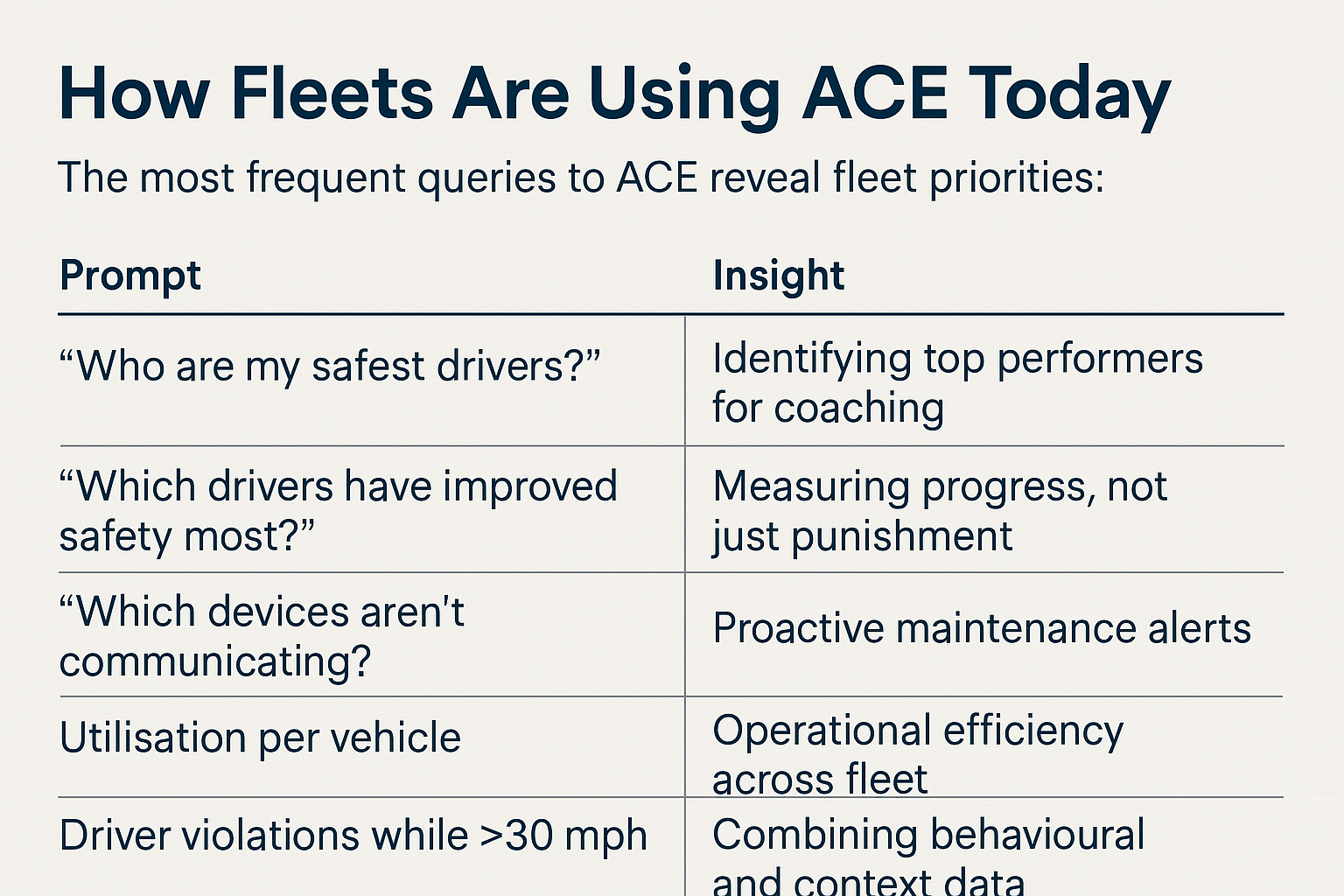
The top five prompts since Geotab launched the early adopter program for Geotab Ace in May 2024 include:
One of these shifts in fleet priorities has been a greater emphasis on driver wellbeing and driver safety, which is linked to the driver shortage in the UK and Europe. Ace can correlate a range of driver behaviours such as seatbelt use, speeding, fatigue events, and dashcam footage to produce these actionable insights. Fleet managers are moving from a "stick" approach (punishing poor drivers) to a "carrot" approach (rewarding improved drivers). Through a joint venture with Vitality, Geotab is promoting a reward-based model of driver engagement (“Geotab Vitality”), where strong safety and performance metrics are linked to health incentives. This is helping promote safer driving practices.
This focus on driver well-being and safety has been formally recognised, with Geotab winning the “Innovation in Risk Management” at the 2025 Great British Fleet Awards for a system that reduced on-road incidents by 78% and cut claims costs by 96% for a patient transport provider. Furthermore, in late 2024, Geotab received its second consecutive Prince Michael International Road Safety Award, recognising its achievements in using predictive analytics and AI for driver behaviour and compliance.
Fleet electrification
With increasingly stringent emissions regulations, there is growing pressure on fleets to transition to zero-emission vehicles. This has presented a significant growth area for Geotab. With a 63% year-on-year increase in connected EVs, the company has collected over 700 million miles (1.12 billion km) of EV data, including battery degradation modelling and real-time charge tracking. More than 700 million EV miles have already been logged through the platform, with Ace now supporting EV suitability assessments linked to Geotab’s Electric Vehicle Suitability Assessment (EVSA), a data-led tool which has mapped the drive cycles of over 800,000 commercial vehicles to identify candidates for electrification. When combined with Ace, this tool helps fleet operators model EV suitability, plan depot charging logistics, and compare emissions, maintenance, and utilisation between ICE and electric vehicles. This is particularly important given that a study found 58% of medium-duty and 41% of heavy-duty vehicles in US fleets drive under 250 miles (402 km) per depot trip, making them prime candidates for electrification.
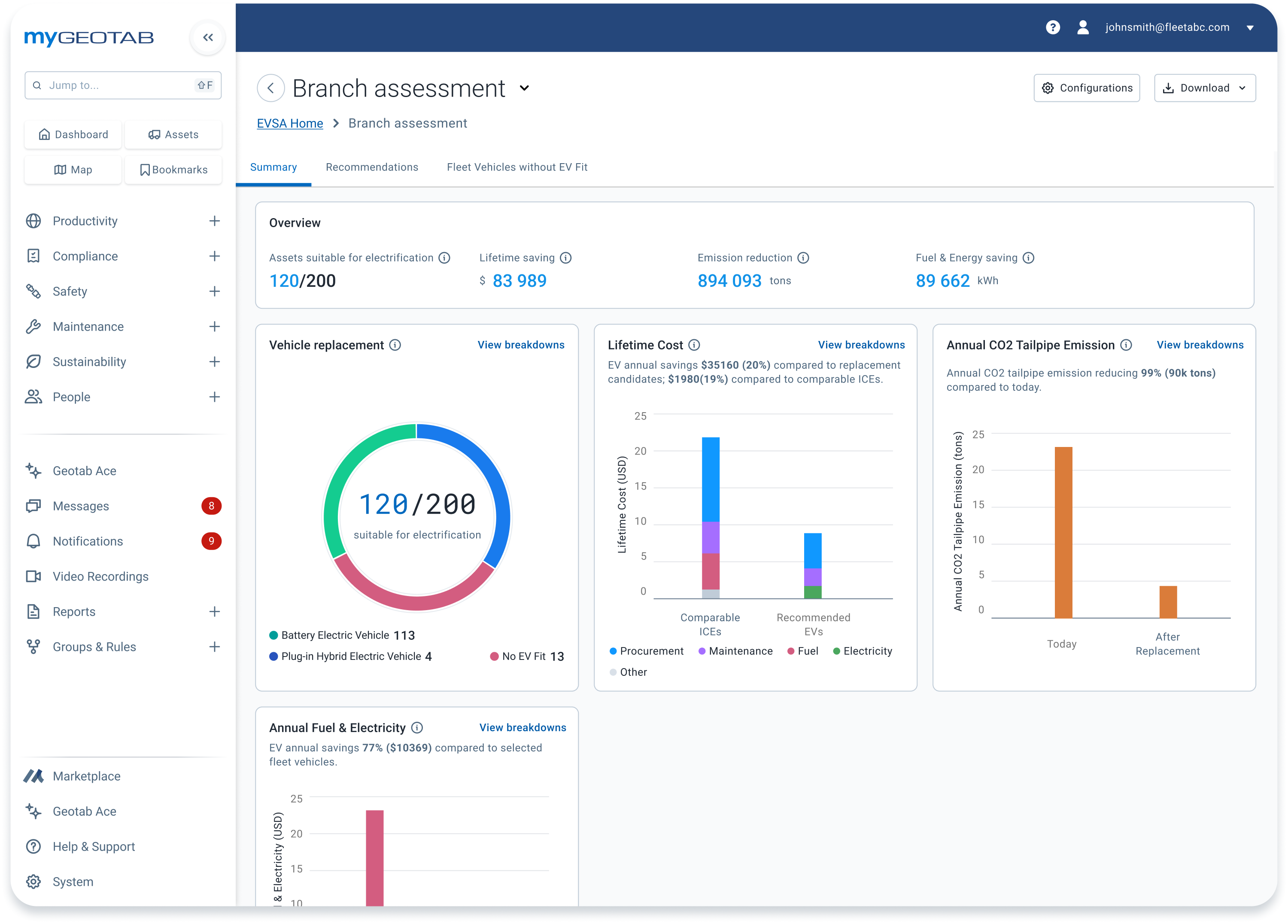
A map visual from the EVSA showing ICE vs EV cost/emissions breakdown
Converting pilot projects into customers
For potential customers, Geotab often begins with a pilot project tailored to each fleet, lasting anywhere between three to six months. These pilots define clear goals, train users, and track results across safety, emissions, or cost metrics. Jarvis noted that the growing presence of in-house telematics managers in large fleets helps streamline the transition from pilot to full deployment. One pilot with the Go-Ahead Group focused on proactive maintenance using engine alerts, which led to immediate improvements in fleet reliability and preventing breakdowns. This also allowed Go-Ahead to effectively monitor battery levels, manage its entire fleet in all weathers and support its sustainability goals.
Jarvis highlighted two critical aspects of turning pilot projects into long-term customers, emphasising that no two pilots follow the same pattern. The first is whether the pilot successfully achieves its intended goals, such as reducing vehicle idling. More importantly, however, is managing internal stakeholders effectively within the client’s organisation, ensuring buy-in from different departments and, in some cases, union representatives.

Vehicle fleet
The UK market: Challenges and adoption
The UK market has been more cautious about adopting generative AI compared to its European counterparts. A Geotab customer survey in October 2024 found that only 32% of UK fleet managers felt confident using AI tools, a stark contrast to over 50% in countries like Germany and France. Jarvis attributes this to a "hesitancy around ‘black box’ systems and legacy system inertia”.
To counter this, Geotab has focused on "explainable AI," ensuring transparency by showing users the underlying logic and assumptions of Ace. The company has also created a dedicated onboarding team and offers workshops and industry-specific configuration templates to accelerate adoption. These efforts are helping to overcome resistance.
The future: Expansion and specialisation
Looking ahead, Geotab UK plans to continue expanding into public services, construction logistics, and fleet leasing. The company aims to significantly increase the number of Ace-active fleets in the UK by the end of 2026. Jarvis's vision is based on a three-pronged strategy: growing the footprint in large and mid-sized fleets (with flexible, use-case-driven implementations); deepening OEM integrations; and positioning safety and sustainability as joint outcomes rather than separate Key Performance Indicators (KPIs). The company is also testing vertical-specific AI models internally, with a view to developing modules for specific sectors like passenger transport fleets.
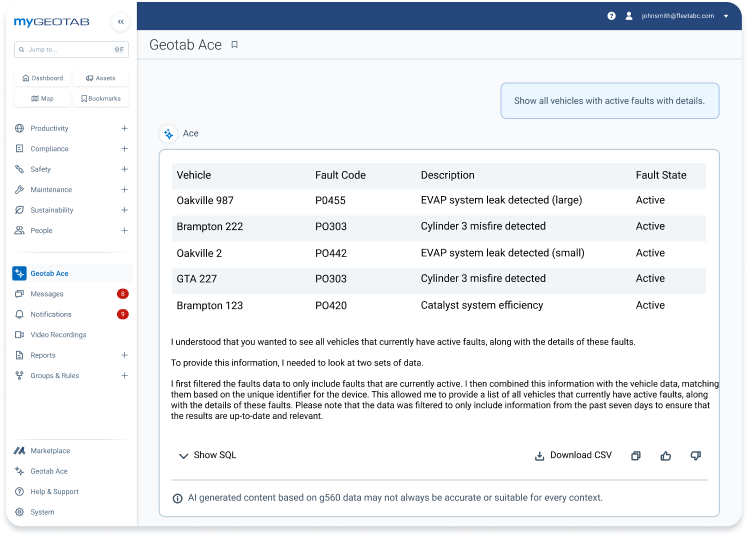
Geotab Ace used by a fleet manager
Over one year after its launch, Geotab Ace is no longer a futuristic concept but a core element of modern fleet management. By augmenting human decision-making with real-time, explainable AI, Geotab is helping fleets navigate the complexities of safety, sustainability, and operational efficiency. The company is cementing its role as a data-driven companion for fleets with ambitious ESG targets, ensuring that as regulatory pressures increase and fleets electrify, having an AI that understands their vehicles (and business) and speaks their language will no longer be a luxury but a necessity. Enter Geotab Ace: an intelligent partner fluent in fleet management.

